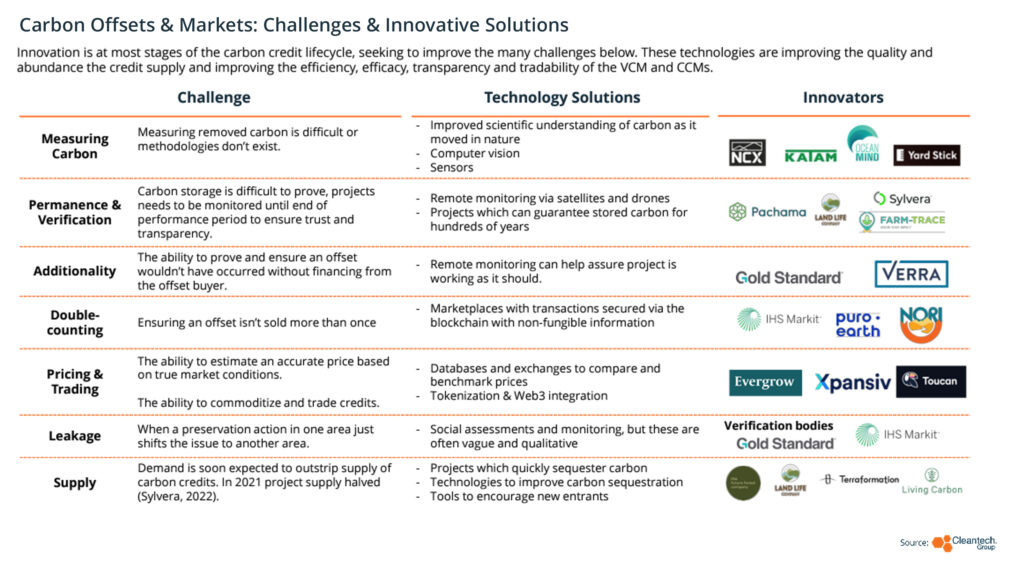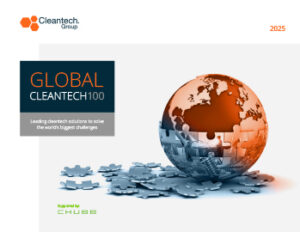The Offset Market is Broken: Can Cleantech Fix It?
The offset market is currently in disarray, with many corporations “greenwashing” regarding their net-zero claims – whether naively or on purpose. However, it is important to note that the issues with the market are not entirely the fault of these companies. There are fundamental problems with the offset projects themselves, as well as the market in recording, regulating, and trading offsets.
Despite these challenges, there is a high demand for offsets, and the market is both complex and rapidly growing. This has encouraged innovators to enter the market, with the potential to transform it into a functioning system. This blog draws from insights from our client Sector Insight, Carbon Offsets & Markets, published in December 2022.
Why Does it Matter?
The importance of offsets lies in their function – as a means of compensation for harmful actions. Offsets are not a direct reduction of emissions, but rather a way of counterbalancing them. Projects can either be:
- Avoidance: Avoid emissions being released, e.g., renewable energy
- Removal: Removal of emissions from air, soil or water, e.g., reforestation
However, it is essential to recognize that these offset projects only address a portion of the problem, as the emissions being compensated for have a long-lasting impact on the atmosphere and can also have other detrimental effects, like soil quality or negative social impacts. In essence, the true environmental impact of one tonne of emissions cannot always be offset by purchasing one tonne of offsets.
How Are Corporates Greenwashing?
Corporations are being accused of ‘greenwashing’ – making grandiose claims about their environmental impact while failing to adequately address the true effects of their carbon emissions. A 2021 Bloomberg study found that many large corporations that have claimed to be net-zero have an offset portfolio that is over 50% composed of renewable energy offsets, which are not necessarily effective in reducing emissions. This is because renewable energy projects are cheaper than oil and gas and so they would have likely been developed regardless of offset purchases.
However, it is important to note that the buyers of these offsets are not necessarily at fault – many of the offsets were certified by trusted third parties who have since stopped certifying many renewable energy projects. Additionally, there is a lack of high integrity offset options available in the first place.
The Many Challenges
Offset projects, e.g., Reforestation, CCUS, or soil carbon
- Proving that a project could not have been developed without the offset buyer.
- Tracking the location and long-term sequestration of the carbon.
- Ensuring that the project does not have any unintended negative consequences.
Market, e.g., Certifying, pricing, trading
- Ensuring the emissions reduction or avoidance has only been claimed once.
- Certifying that the credit is unique enough to avoid this, yet similar enough to trade.
Innovation is at most stages of the carbon credit lifecycle, seeking to improve the many challenges detailed in the chart below. These technologies are improving the quality and abundance the credit supply and improving the efficiency, efficacy, transparency and tradability of carbon offset markets.

Others risks include operational risks, social impact, monocultures, biodiversity, and potential pollution.
Carbon as a Tradable Commodity
Transforming carbon into a tradable commodity is a complex process, as the carbon credits can vary greatly in terms of type and quality, and there is no universally accepted method for determining a fair price. Additionally, the lack of standardization and oversight in the market makes it difficult to ensure that one is getting the carbon credit they are paying for. It is also not regulated by any similar institution like the Financial Conduct Authority (FCA) or the Securities and Exchange Commission (SEC) that oversee other financial markets, which opens carbon credits up to potential fraud and exploitation.
Cleantech Group Has Offset Our Events – We Think?
Cleantech Group set out to determine how difficult carbon offsets were and to find out whether we could really reverse our carbon emissions by offsetting our 2022 Cleantech Group Forums in Singapore and Brussels.
These were some highlights learned:
- Calculating Emissions: Innovative tools now exist but they were too expensive, often too high-tech, and inappropriate for our ‘one off’ event emissions. Providers have yet to reach economies of scale to offer the low prices SMEs need.
Additionally, a major driver for emissions monitoring technologies is mandatory disclosure regulations, which would require large companies (generally over 500 employees) that track and disclose companywide emissions data. The tools which exist today are mostly catered to these large companies.
- Choosing ‘Good’ Offsets: Some offsets don’t work, or only work for a short period of time. There is a magnitude of challenges to navigate when choosing where to buy offsets and what projects are effective and high-quality.
As Cleantech Group strives to be impartial, as diverse of a portfolio of projects as possible was picked to not favour any specific provider. But there weren’t many sellers to buy from without signing up to a program, subscription, or whom we contacted but did not get back to us. Finally, very few project producers allowed us to buy directly from them.
- Selecting the ‘Correct’ Offset Projects: Selecting the ‘correct’ offset projects was more of an art than a science, with our initial rules sometimes being thrown out in favour of an interesting project which was innovative and in the location of the event but was carbon avoidance.
As impartial and advantageous our project selection approach had been, it made checking on these projects difficult. With only 1 tonne in some cases, across multiple projects it would be an administrative nightmare to check up on all of these — to check for permanence, co-benefits, or if they even exist.
For more details on the Cleantech Group carbon offset initiative, read, We’ve Offset Our Events – Or At Least We Think We Have…
The carbon offset market is flawed, and companies are using it to appear more environmentally friendly. Projects and the offset market are complex with many challenges, so innovators are needed to improve it. However, at present, the market is not effective.



